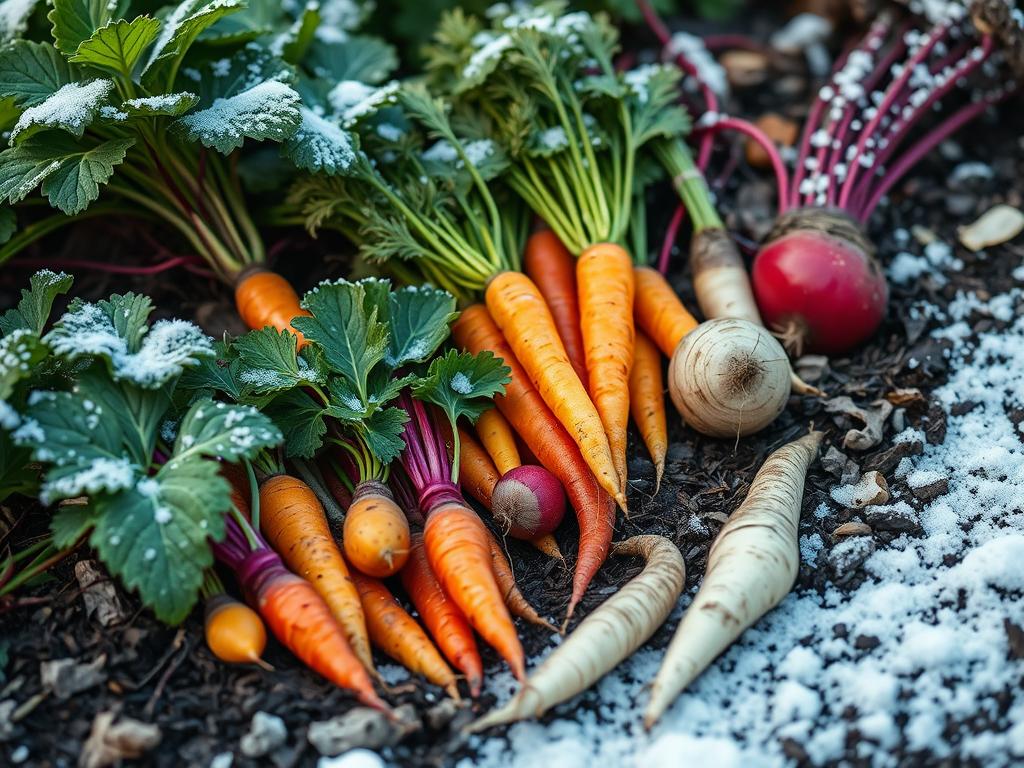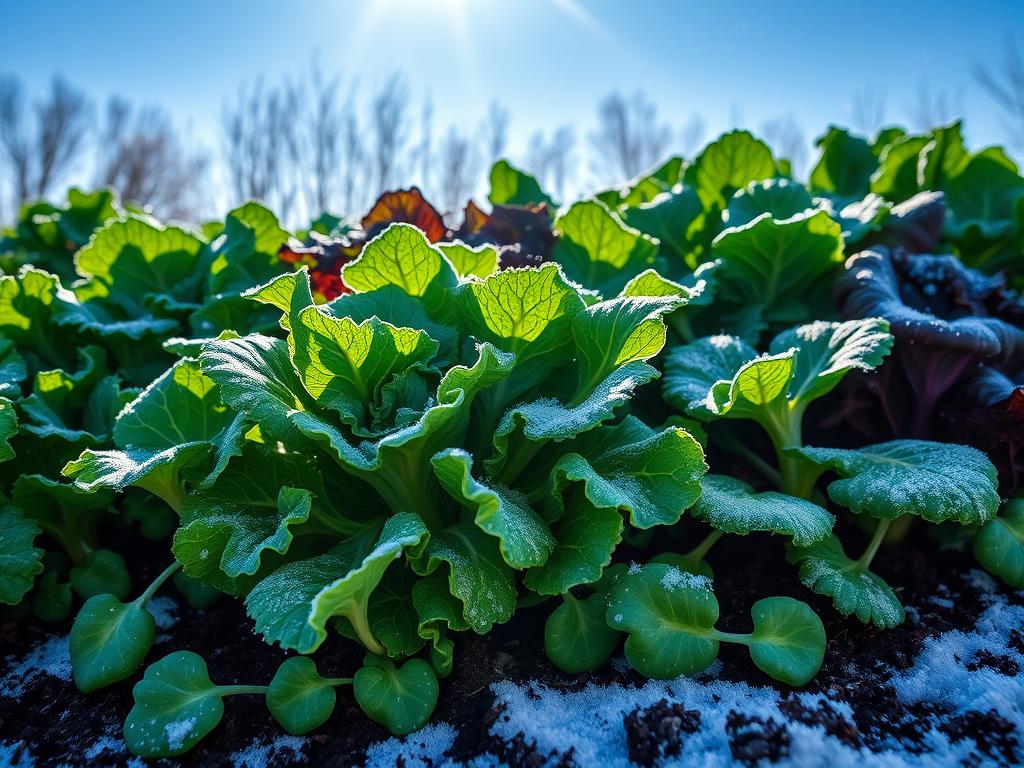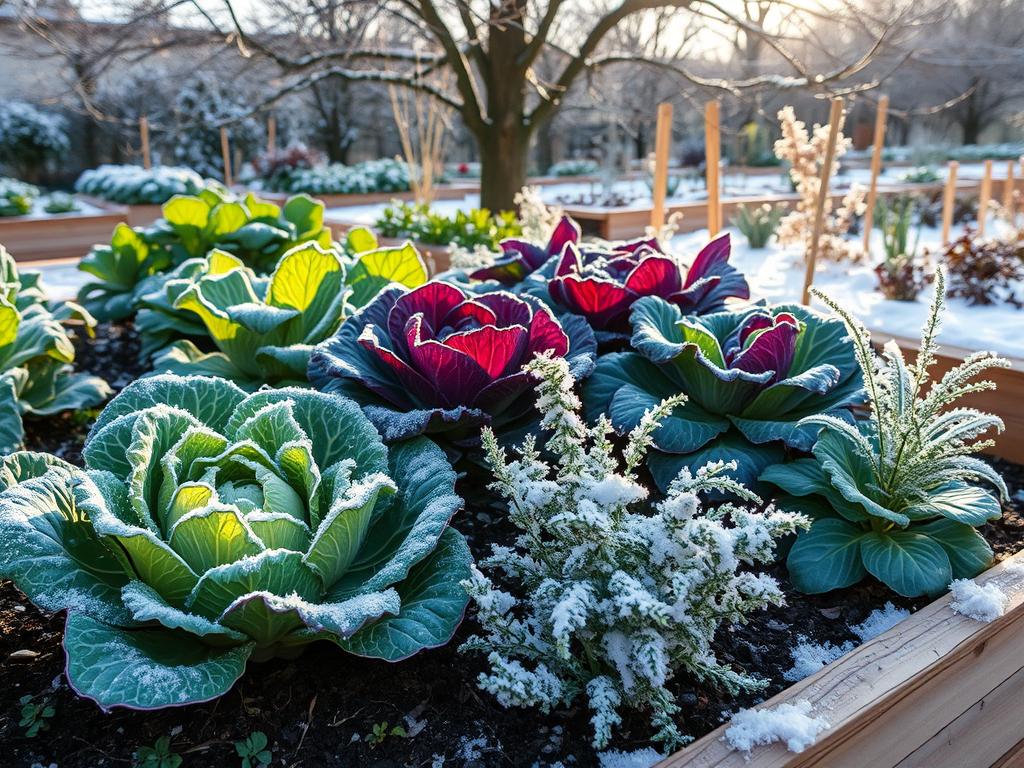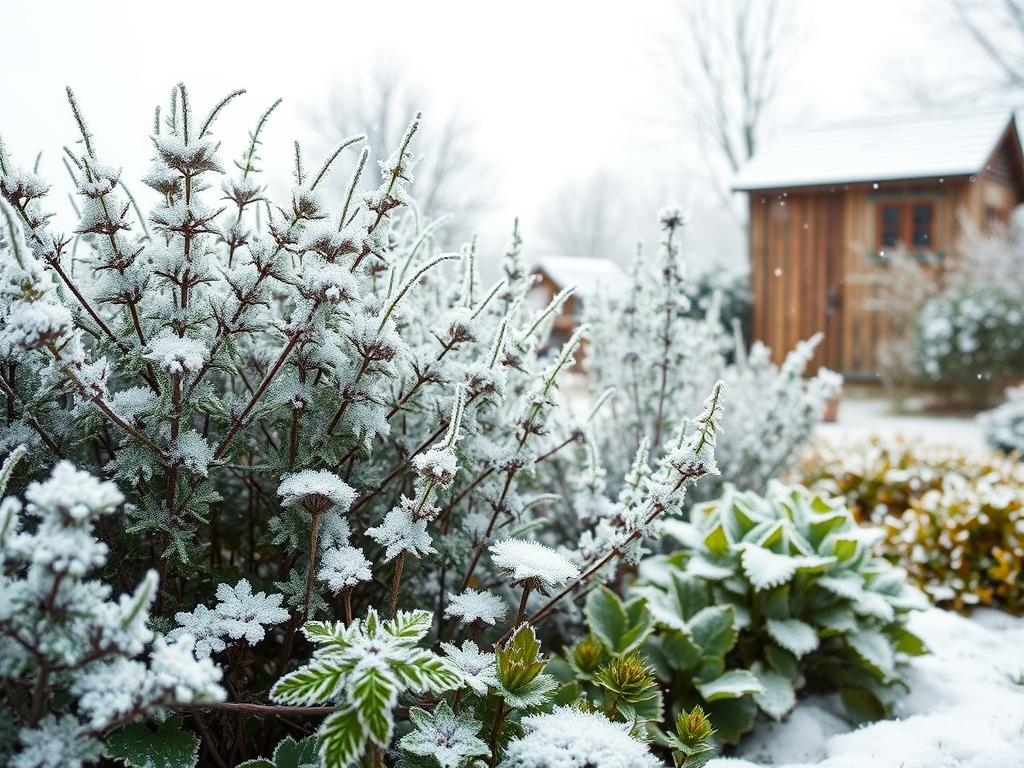As frost patterns appear on your window, you might think gardening is over. But winter can be a season of growth and abundance. Imagine stepping out to a crisp morning, seeing vibrant greens, and picking fresh veggies for dinner. This dream can become real with cold-resistant seeds.
Winter gardening connects you with nature all year and gives you fresh, nutritious food. By picking the right seeds, your garden can be a winter wonderland of food. You can grow everything from frosty kale to sweet winter carrots.
Embrace the challenge and rewards of gardening in the cold. With the right seeds and planning, you’ll find new gardening possibilities. Let’s see how to keep your garden alive and thriving even when it’s cold.
Understanding Winter Gardening
Winter gardening opens up a world of possibilities for green-thumbed enthusiasts. By planting cold-tolerant vegetable seeds, you can enjoy fresh produce all year. This practice not only extends your harvest but also keeps your garden alive during colder months.
Benefits of Year-Round Gardening
Growing frost-resistant garden seeds has many benefits. You’ll have fresh, homegrown vegetables even when prices at the store are high. Plus, winter gardening keeps your soil healthy by always working on it.
Challenges of Winter Gardening
Winter gardening comes with its own set of challenges. Cold temperatures, frost, and less sunlight can slow down plant growth. It’s important to choose the right seeds for winter gardening. Look for seeds labeled as “cold-tolerant” or “frost-resistant” to help your garden survive the cold.
Importance of Proper Planning
Successful winter gardening needs careful planning. Start by picking the right seeds that can handle the cold. Also, get your soil ready early. Plant your seeds early enough so they can grow before the harsh weather hits. With the right planning, you’ll get a great harvest of winter vegetables from your chosen seeds.
“Winter gardening is not just about survival, it’s about thriving in the face of nature’s challenges.”
Cold-Resistant Winter Garden Seeds: An Overview
Choosing the right cold-weather vegetable seeds is crucial for a successful winter garden. These seeds are made to handle cold temperatures and frost. This lets you have fresh produce even when it’s freezing.
Some of the best plants for winter gardens are carrots and turnips. They can stay alive underground even when the soil freezes. Spinach, kale, and Brussels sprouts are also tough. They can last through light frosts and even temperatures as low as 20°F.
When picking seeds for your winter garden, think about these things:
- Your local climate and average winter temperatures
- The amount of sunlight your garden gets in winter
- The type of soil in your garden
- Your preferred vegetables and what you like to cook
With the right cold-resistant seeds and good care, you can have a lot of produce in the winter. Remember, a great winter garden needs careful planning and the best seeds.
Preparing Your Garden for Winter Planting
Getting your garden ready for winter is crucial for growing in the cold. With the right steps, you can have fresh produce all winter. Let’s look at how to prepare your garden for winter planting.
Soil Preparation Techniques
First, enrich your soil. Add compost and organic matter to make it fertile and well-draining. This helps your winter crops grow well. Mix in aged manure or leaf mold for even better soil quality.
Timing Your Planting
Planting at the right time is key for winter veggies. Do it in late summer or early fall. This lets your plants get established before it gets cold. Remember to check your local frost dates and plan your planting.
Setting Up Season Extenders
Use season extenders to protect your plants from bad weather. These methods help your plants survive the cold:
- Row covers: Lightweight fabric that shields plants from frost
- Cold frames: Bottomless boxes with transparent tops to trap heat
- Hoop tunnels: Plastic-covered structures that create a greenhouse effect
By using these tips, you’ll be on your way to a great winter garden. Remember, getting ready is the first step to a successful winter garden.
Top Vegetables for Winter Gardens
Winter gardening lets you keep growing fresh produce. Many vegetables do well in the cold, keeping your garden active all year. Let’s look at some great choices for your winter garden.
Root Vegetables
Root vegetables are great for the cold. Carrots, turnips, and parsnips get sweeter in the cold. They store energy in their roots, making them perfect for winter.

Leafy Greens
Leafy greens are key in winter gardens. Spinach, kale, and Swiss chard love the cool weather. These greens keep growing after light frosts, giving you fresh salads all winter.
Brassicas
Brassicas are top cold-hardy vegetables. Broccoli, cabbage, and Brussels sprouts handle freezing well. These plants often taste better after being cold, making them great for winter gardens.
- Broccoli: Forms tight, flavorful heads in cool weather
- Cabbage: Develops crisp, sweet leaves perfect for slaws and stews
- Brussels sprouts: Produces tasty mini-cabbages along their stalks
Adding these vegetables to your winter garden means you’ll have fresh produce in the coldest months. Choose varieties made for the cold to get the most from your garden.
Best Cold-Hardy Lettuce Varieties
Winter lettuce varieties are perfect for your cold-season garden. They can handle cold temperatures, letting you enjoy fresh salads even when it’s freezing.
Some top winter salad greens are:
- ‘Winter Density’: A compact, crisp lettuce that thrives in cool weather
- ‘Arctic King’: Known for its excellent frost resistance
- ‘Rouge d’Hiver’: A red-tinged variety that adds color to winter gardens
These varieties can survive temperatures as low as 25°F (-4°C). In milder areas, plant lettuce in succession for a continuous harvest.
“Lettuce is the perfect crop for winter gardeners. It’s easy to grow and provides a fresh, crisp addition to meals during the cold months.”
To keep your lettuce growing longer, use row covers. These barriers protect your lettuce from harsh weather, letting you enjoy homegrown greens into the cold months.
By picking the right cold-hardy lettuce and caring for it well, you can have a steady supply of fresh, nutritious greens all winter.
Nutrient-Rich Winter Greens to Grow
Winter greens are packed with nutrients during the cold months. These leafy vegetables not only survive frost but also thrive in it. Let’s look at some nutrient-dense winter crops you can grow in your garden.

Spinach
Spinach is a top choice for winter greens. It can handle temperatures as low as 20°F. It’s full of iron and vitamins, grows fast, and gives multiple harvests.
Kale
Kale is a tough winter green that gets sweeter after frost. It’s full of vitamins A, C, and K. Plant kale in late summer for a winter harvest.
Swiss Chard
Swiss chard is a green that tolerates frost well. It adds color to your winter garden. This vegetable is rich in antioxidants. You can pick its leaves one by one, letting the plant keep producing.
- Spinach: Thrives in cold, rich in iron
- Kale: Sweetens with frost, high in vitamins
- Swiss Chard: Frost-tolerant, colorful, and nutritious
Growing these winter greens means you’ll have a steady supply of fresh, nutrient-rich veggies even in the coldest months. They can handle frost, making them perfect for extending your growing season.
Root Vegetables That Thrive in Cold Weather
Winter root vegetables are perfect for cold-weather gardens. They can handle freezing temperatures and even taste better as it gets colder. If you want to grow food longer, these cold-hardy crops are a great pick.
Carrots, turnips, parsnips, and beets are great for winter gardens. These hardy veggies can stay in the ground under mulch, ready to be picked in the cold months. The cold makes them sweeter by increasing their sugar content.
To make the most of your winter root vegetables:
- Plant in late summer for best results before the ground freezes
- Use mulch to keep the soil and roots warm
- Pick them as you need them during winter
Trying out frost-resistant root vegetables can make your winter meals more interesting. With the right planning and care, you can enjoy fresh, homegrown food even when it’s snowy outside.
“Winter gardening isn’t about waiting for spring; it’s about embracing the unique flavors and textures that cold weather brings to our root vegetables.”
Cold-Tolerant Herbs for Winter Gardens
Winter herbs add life to your garden during the cold season. Many frost-hardy herbs do well in chilly weather, giving you fresh flavors all year. Let’s look at some cold-resistant herbs great for your winter garden.
Rosemary, thyme, and sage are strong winter herbs that handle freezing temperatures. These perennials keep giving aromatic leaves as it gets colder. Parsley is another herb that stays fresh in winter, adding a bright touch to dishes.
Some herbs actually do better in the cold. Cilantro and chervil grow well in winter, often doing better than in summer. These herbs bring unique flavors to winter meals.
Fresh herbs from your winter garden can transform simple dishes into gourmet experiences.
To help your frost-hardy herbs, plant them smartly. Put them near a south-facing wall for extra protection from winter. This trick can make your growing season longer and keep your herb supply fresh.
- Rosemary: Thrives in cold weather
- Thyme: Maintains flavor through winter
- Sage: Frost-resistant and aromatic
- Parsley: Adds freshness to winter dishes
- Cilantro: Prefers cool temperatures
- Chervil: Flourishes in winter gardens
With these cold-resistant herbs, your winter garden can be a source of fresh flavors and inspiration during the coldest months.
Selecting the Right Brassica Seeds for Winter
Winter brassicas are perfect for cold-season gardens. They love chilly temperatures and can give you fresh produce in the cold months. Let’s look at some popular cold-hardy brassica varieties for your winter garden.
Broccoli
Broccoli is a nutritious and versatile winter brassica. Plant ‘Waltham 29’ or ‘Green Goliath’ in late summer. These varieties take 60-80 days to grow and can handle light frosts. Harvest the main head when it’s ready, then enjoy side shoots all winter.
Cabbage
Cabbage is great for winter gardens. Try growing ‘January King’ or ‘Deadon’ varieties. These plants can survive temperatures as low as 20°F (-6°C). Plant them 80-100 days before the first frost for a big winter harvest.
Brussels Sprouts
Brussels sprouts get tastier after frost. Plant them in mid to late summer for winter eating. ‘Long Island Improved’ and ‘Diablo’ are reliable varieties. These plants take about 90-100 days to get ready, so plan well.
Remember to space your brassicas right and give them rich, well-draining soil. With the right care, these cold-hardy brassicas will give you fresh, nutritious veggies all winter.
Companion Planting in Winter Gardens

Winter companion planting is a great way to make the most of your cold-weather garden. By choosing the right plant partners, you can help your plants grow better and keep pests away. Let’s look at some top picks for winter garden pairings to boost your harvest.
Brassicas, such as cabbage and broccoli, do well with certain herbs. Try planting rosemary or sage near them to keep pests away. These herbs not only keep pests off your plants but also add tasty flavor to your meals.
Root vegetables are great for winter gardens. Consider planting carrots next to onions. This combo helps keep carrot flies away and uses garden space wisely. Fall gardening gets better with these smart pairings.
To increase your harvest, plant fast-growing crops among slower ones. Spinach and lettuce are good choices to plant between winter vegetables. This method not only grows your harvest but also fights weeds.
- Pair brassicas with aromatic herbs
- Plant carrots with onions
- Interplant fast-growing crops between slow ones
Using these winter companion planting tips, you’ll have a garden that thrives in the cold and gives you a big harvest. Try out different pairings to see what works best in your garden.
Protecting Your Winter Garden from Frost
Winter gardening comes with its own set of challenges. Frost can harm or even kill your plants. But, with the right frost protection, you can keep your garden healthy. Let’s look at ways to protect your winter garden from the cold.
Using Row Covers
Row covers are a great way to keep frost away. They’re lightweight fabrics that block frost but let sunlight and water through. Put them over your plants at night to keep in the heat. Then, take them off during the day for your plants to get sunlight and air.
Creating Cold Frames
Cold frames are like mini greenhouses for your garden. They protect your plants from frost. Build one with wood and a clear top to catch sunlight and warm the soil. Put cold frames over your plants to make a warmer spot than outside.
Mulching Techniques
Mulching is key for keeping your garden warm in winter. Use organic stuff like straw, leaves, or compost around your plants. It keeps the soil warm, protects roots from freezing, and holds moisture in. Mulch also stops soil from washing away and keeps weeds down.
Using these methods can make your garden grow longer into the winter. You’ll get to enjoy fresh produce even when it’s freezing. Always check the weather forecast and change your protection as needed to keep your garden doing well.
Maintaining Your Winter Garden

Winter garden care needs careful attention and regular checks. Make sure to look for pests, keep soil moist, and clear snow from covers. These steps help your winter garden do well.
Watering in winter is tricky. Since cold soil holds moisture well, water only when the top inch of soil feels dry. This prevents root rot.
- Remove diseased or dead plant material promptly
- Check protective structures for damage after storms
- Monitor soil temperature and moisture levels
Harvesting often keeps your winter garden productive. Pick leafy greens regularly and gently remove snow from plants. This stops stems from breaking and lets your crops get enough light.
“Winter gardening is a dance with nature. Stay vigilant, and your garden will reward you with fresh produce all season long.”
Mulching is key for winter garden care. Put a thick layer of organic mulch around your plants. It insulates the soil, protects roots from freezing, and keeps soil moist and weed-free.
By doing these winter garden care steps, your cold-weather crops will flourish. Remember, regular care and proper management are vital for a good harvest, even in the cold months.
Harvesting Winter Vegetables
Harvesting winter veggies comes with its own set of challenges and rewards. You’re ready to pick your cold-season garden’s bounty. But, timing and technique are key for the best results.
Optimal Harvest Time
Pick your winter veggies during the warmest part of the day. This makes sure plants are thawed and less likely to get damaged. Many root vegetables can stay in the ground until you need them, acting like nature’s fridge.
Harvesting Best Practices
Use clean, sharp tools for harvesting winter veggies. This cuts down on plant damage and lowers disease risk. Gently brush off excess soil from root crops before taking them inside.
Cold-Weather Crop Storage
Proper storage is crucial for enjoying your harvest long-term. Store most winter produce in cool, humid conditions. Root cellars or refrigerators are great for this.
- Keep root vegetables in damp sand
- Store leafy greens in perforated plastic bags
- Hang herbs to dry in a cool, dark place
Preserving winter garden produce lets you enjoy your homegrown veggies longer. Some crops, like kale and Brussels sprouts, get even better in flavor after light frosts. This adds a sweet touch to your winter meals.
Troubleshooting Common Winter Garden Issues
Winter gardening can be tough, but knowing how to fix problems makes it easier. Frost often damages plants, causing blackened or wilted leaves. Cut off the damaged parts quickly to save the plant. Use covers or cloches to protect plants from frost later on.
Even in winter, pests like aphids and slugs can be a problem. Check your plants often and remove pests by hand or with organic methods. This helps keep your garden healthy during the cold months.
Heavy rains can cause soil erosion in winter gardens. Here’s how to fight it:
- Use cover crops to protect bare soil
- Apply a layer of mulch around plants
- Create raised beds to improve drainage
These steps help prevent erosion and keep the soil in good shape. They ensure your garden stays healthy even in the cold. By solving these winter gardening issues, you’ll have a great winter garden.
“Winter gardening is not for the faint of heart, but with patience and persistence, it can be incredibly rewarding.”
Conclusion
Winter gardening lets you grow vegetables all year. By using cold-season gardening tips, you can have fresh produce even when it’s cold. With the right planning and techniques, your garden can flourish all year.
Winter gardening is more than just growing veggies. It helps you learn new gardening skills, saves money on groceries, and is a fun hobby in the off-season. By picking plants that can handle the cold and using protective methods, you can beat winter’s challenges.
Getting your winter garden to succeed takes preparation and patience. Just like picking the right soil for other plants, choosing the best soil for winter crops is key. With hard work and the right strategy, you’ll be enjoying fresh, homegrown veggies from your winter garden soon.
FAQ
What are the benefits of winter gardening?
Winter gardening lets you grow food all year. It also keeps the soil healthy by always working on it.
What challenges are involved in winter gardening?
Winter gardening faces cold, frost, and less sunlight. But, with good planning and care, you can overcome these challenges.
Why are cold-resistant seeds important for winter gardens?
Cold-resistant seeds can handle the cold and frost. This means they grow and produce well in winter.
How do you prepare the soil for winter planting?
Start by adding compost and organic stuff to the soil. This makes it rich and drains well. Also, plant most winter crops in late summer or early fall.
What are some popular vegetables for winter gardens?
Great winter veggies are carrots, turnips, spinach, kale, broccoli, cabbage, and Brussels sprouts.
What are some cold-hardy lettuce varieties to grow in winter?
‘Winter Density’, ‘Arctic King’, and ‘Rouge d’Hiver’ are good lettuces for winter.
Which nutrient-rich greens thrive in cold weather?
Spinach, kale, and Swiss chard are great for cold weather. They give you important vitamins and minerals in winter.
How do you protect your winter garden from frost?
Use row covers, make cold frames, and mulch. These keep plants warm and help them grow longer.
When is the best time to harvest winter vegetables?
Harvest in the warmest part of the day when plants thaw. Use clean, sharp tools to avoid harming the plants.
What are some common issues in winter gardens?
Frost damage, pests, and soil erosion from rain are common. But, you can manage these with the right care and protection.
